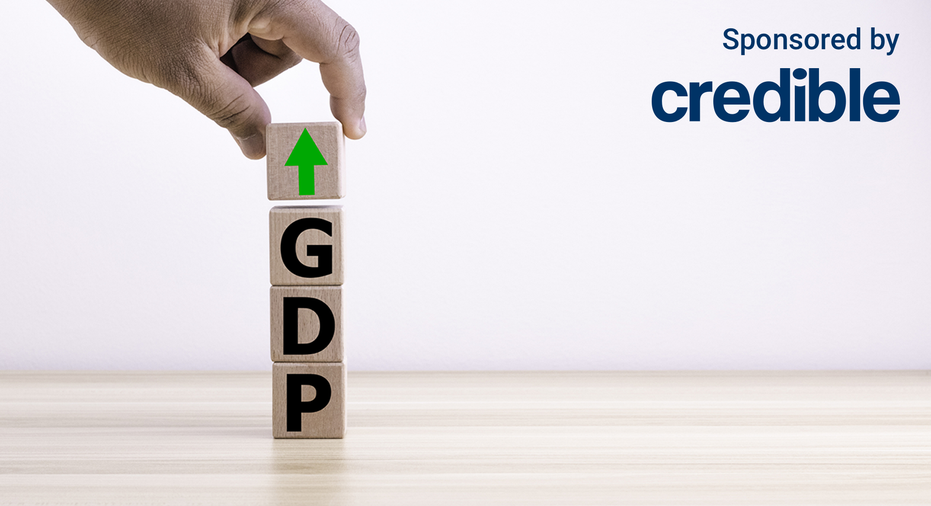Final fourth quarter GDP revised upwards as consumer spending rises
Consumer sentiment improved in March

An uptick in consumer spending helped boost U.S. economic growth in the fourth quarter. (iStock)
The third and final estimate for real gross domestic product (GDP) in the fourth quarter of 2023 was revised upwards, showing that the U.S. economy grew at an annual rate of 3.4%, according to the Bureau of Economic Analysis (BEA).
The reading comes just above the BEA's second GDP estimate for the fourth quarter, which showed the economy increased at 3.2%. The change primarily reflects upward revisions to consumer spending and nonresidential fixed investment.
Real GDP increased at an annual rate of 3.4% for the October-through-December period after rising 4.9% in the third quarter of 2023. Thursday's final reading comes just under the BEA's original GDP estimate for the fourth quarter, which showed the economy increased at a rate of 3.3% and beat economic forecasts that anticipated a deceleration of growth over the previous month with the expectation that the economy would expand by a 2% rate.
Economic growth is a crucial metric the Federal Reserve is monitoring as it weighs when it will begin dialing back interest rates. Fed officials have predicted at least three rate cuts this year, with interest rates expected to tick down to 4.6%, according to the central bank's updated economic forecasts in its Summary of Economic Projections (SEP). Market expectations are that the first rate cut will come in the summer, if not later in the year.
If you are struggling with high inflation, you could consider taking out a personal loan to pay down debt at a lower interest rate, reducing your monthly payments. You can visit Credible to find your personalized interest rate without affecting your credit score.
SOCIAL SECURITY: COLA INCREASING BUT MEDICARE COSTS RISING TOO IN 2024
High rates weigh on consumer wallets
The Fed's decision to keep interest rates higher for longer puts a strain on consumer wallets and how much they pay to borrow, according to Michele Raneri, the vice president of U.S. research and consulting at TransUnion.
According to a recent TransUnion report, credit card balances surged past the $1 trillion mark for the first time in the fourth quarter of 2023. While Americans charged on their cards, they also increased their unsecured personal loan balances in the fourth quarter. Personal origination balances topped $245 billion, compared to $222 billion the previous year.
"While inflation continues to trend towards more normal levels, today's decision from the Fed is to hold interest rates at their current levels and that any potential decreases will take place later in 2024," Raneri said. "This means U.S. consumers who continue to face relatively high-interest rates across a range of credit products will have to wait at least a bit longer for rate relief. When rates do begin falling, the effects throughout the credit industry will be real but will likely be slow to take root."
Consumers can explore refinancing any high-interest debt into lower-interest credit products to reduce balances once interest rates are brought down, according to Raneri.
If you're worried about high-interest debt, you could consider paying it off with a personal loan at a lower rate to reduce your monthly payments. Visit Credible to get your personalized rate in minutes.
MILLENNIALS ARE DESPERATE TO BUY A HOME, MOST WILLING TO PAY A MORTGAGE RATE ABOVE 7%: SURVEY
Consumer optimism improving
Despite the economic challenges, consumer confidence hit a record high in March. The University of Michigan's benchmark Consumer Sentiment Index rose 3.3% in March to a final reading of 79.4, the highest since July 2021, the University of Michigan said in a report.
The number reflects the improved consumer outlook that inflation will continue to soften and that personal finances will also be lifted as the effects of high prices and expenses on living standards ease, the report said.
Consumers may be more optimistic, but the index remains far from its pre-pandemic highs, reflecting the long shadow of high inflation, according to Jim Baird, Plante Moran Financial Advisors' chief investment officer.
"Consumers are far from ebullient in their assessment of the current state of the economy, their personal financial prospects, and the outlook for the economy further down the path," Baird said. "The fact that consumer sentiment remains constrained against the backdrop of a robust labor economy, strong wage growth, and above-trend economic growth is a direct reflection of the corrosive effects of surging inflation in recent years.
"Paychecks may have experienced a nice boost in recent years, but when those additional dollars are going right back out the door to cover the rising cost of rent, food, gasoline, personal services, and a host of other expenditures, it's no surprise that consumers aren't more upbeat," Baird continued.
If you are struggling to pay off debt, you could consider using a personal loan to consolidate your payments at a lower interest rate, saving you money each month. You can visit Credible to find your personalized interest rate without affecting your credit score.
THIS IS THE #1 CITY FOR FIRST-TIME HOMEBUYERS, AND OTHER HOT US HOUSING MARKETS
Have a finance-related question, but don't know who to ask? Email The Credible Money Expert at moneyexpert@credible.com and your question might be answered by Credible in our Money Expert column.




















